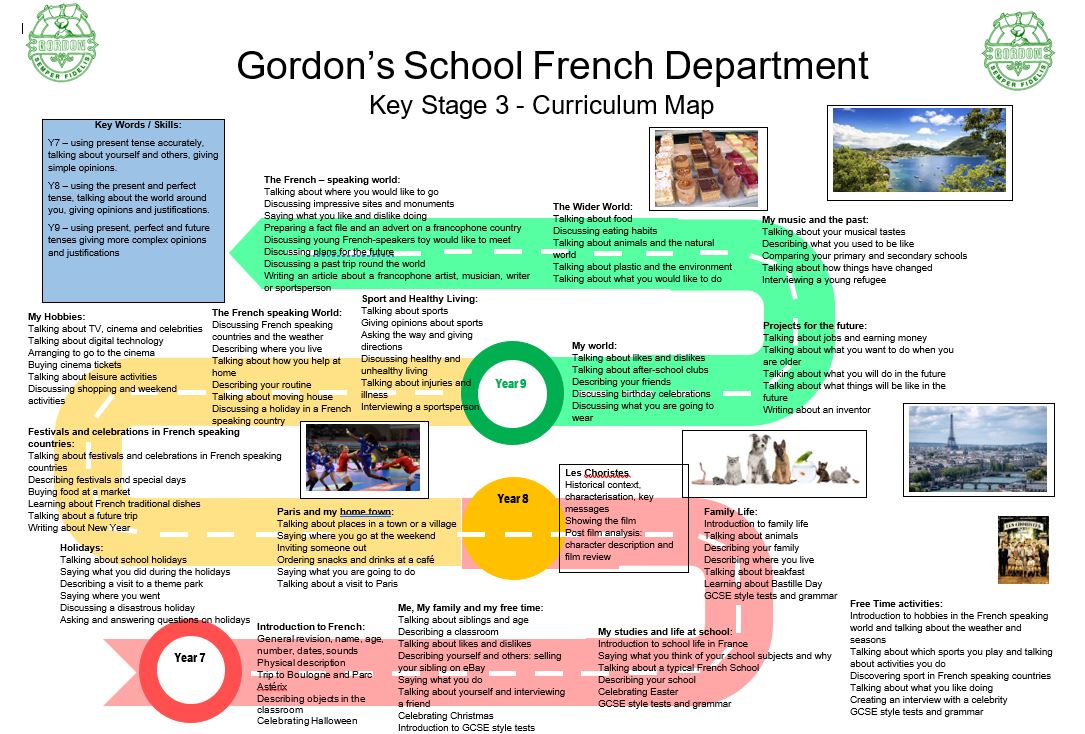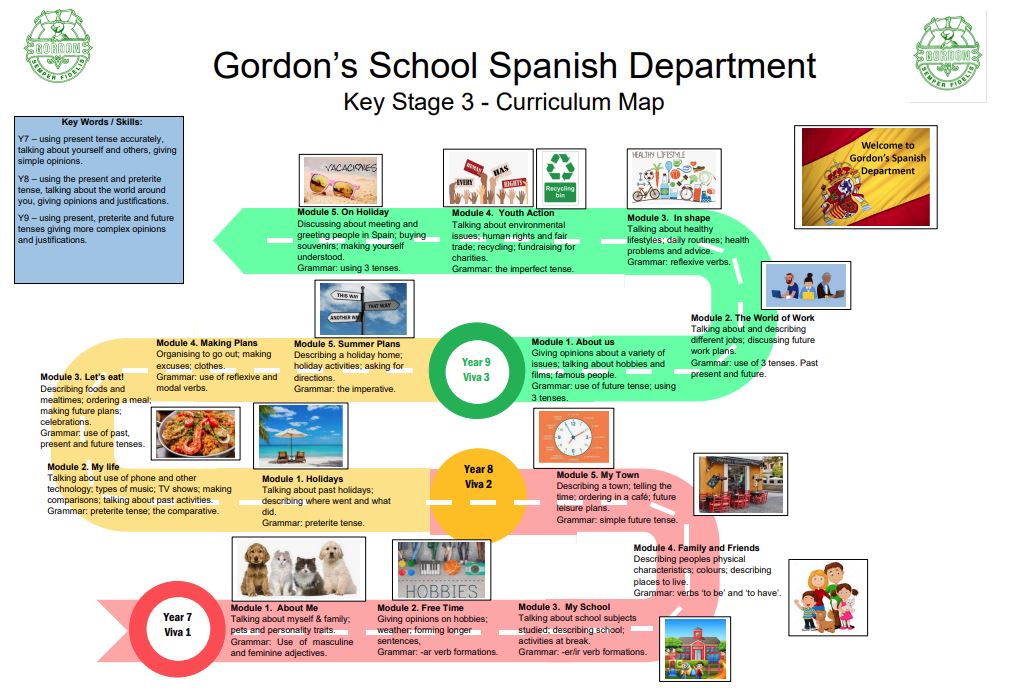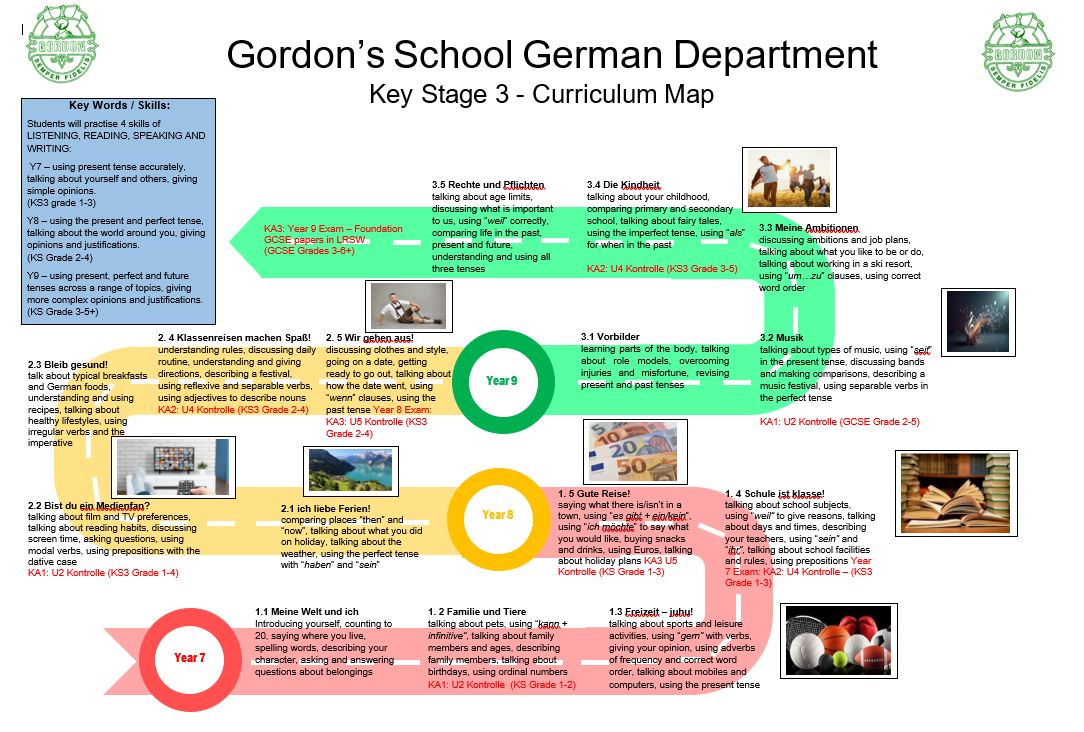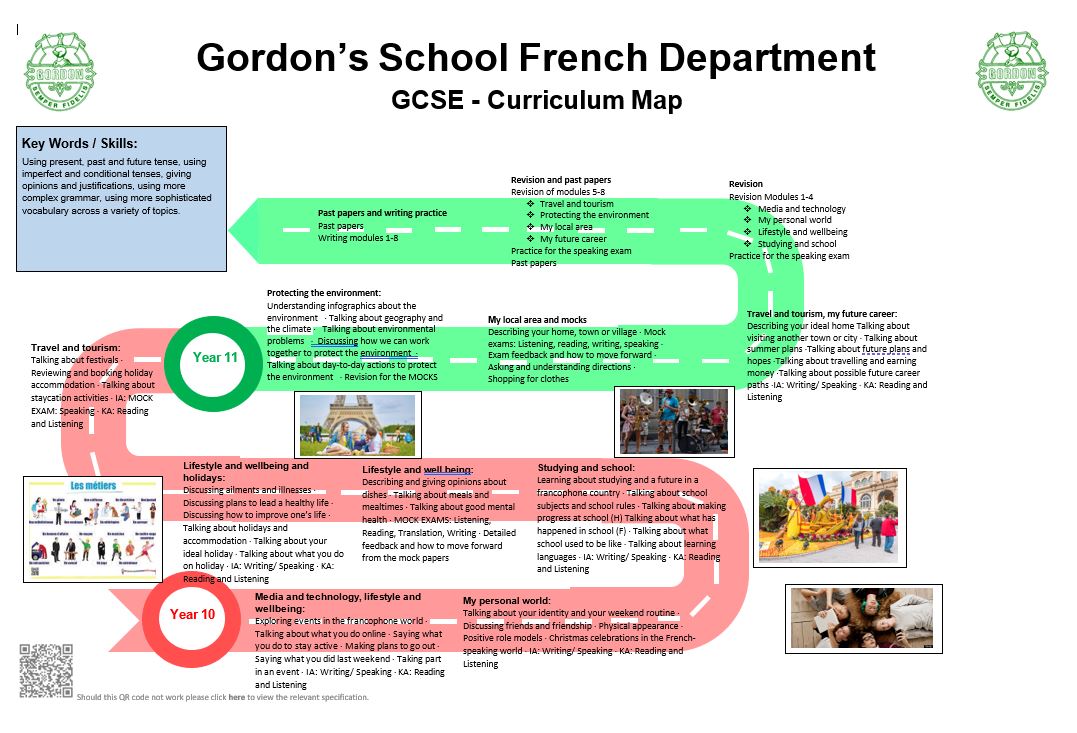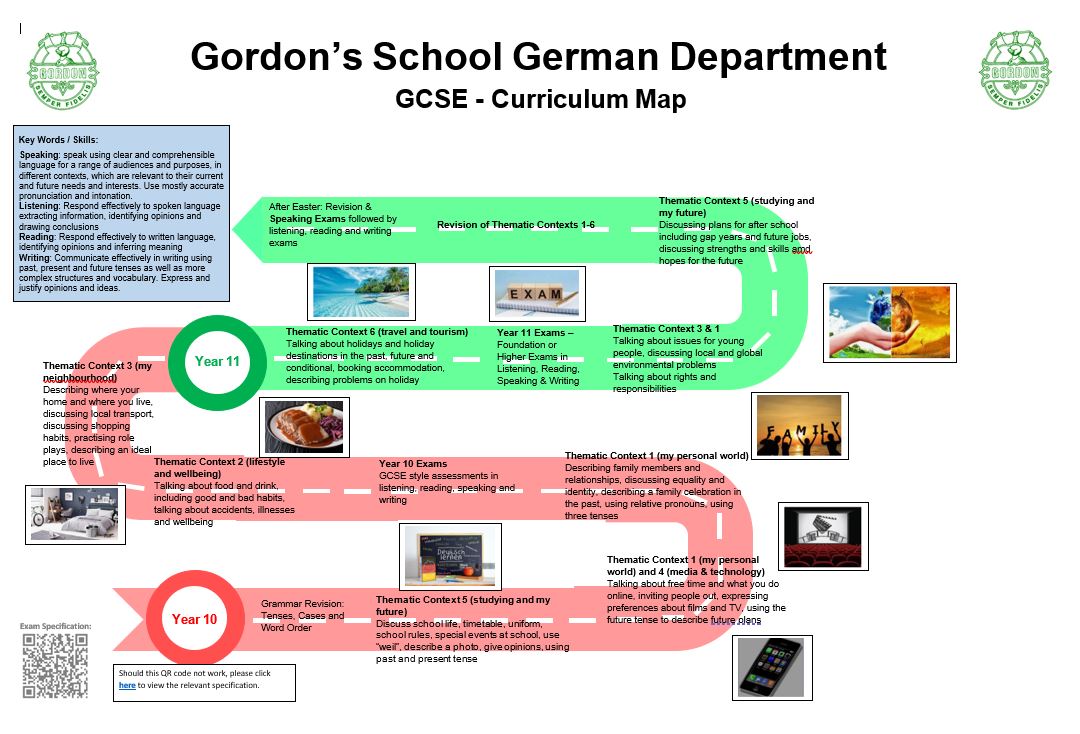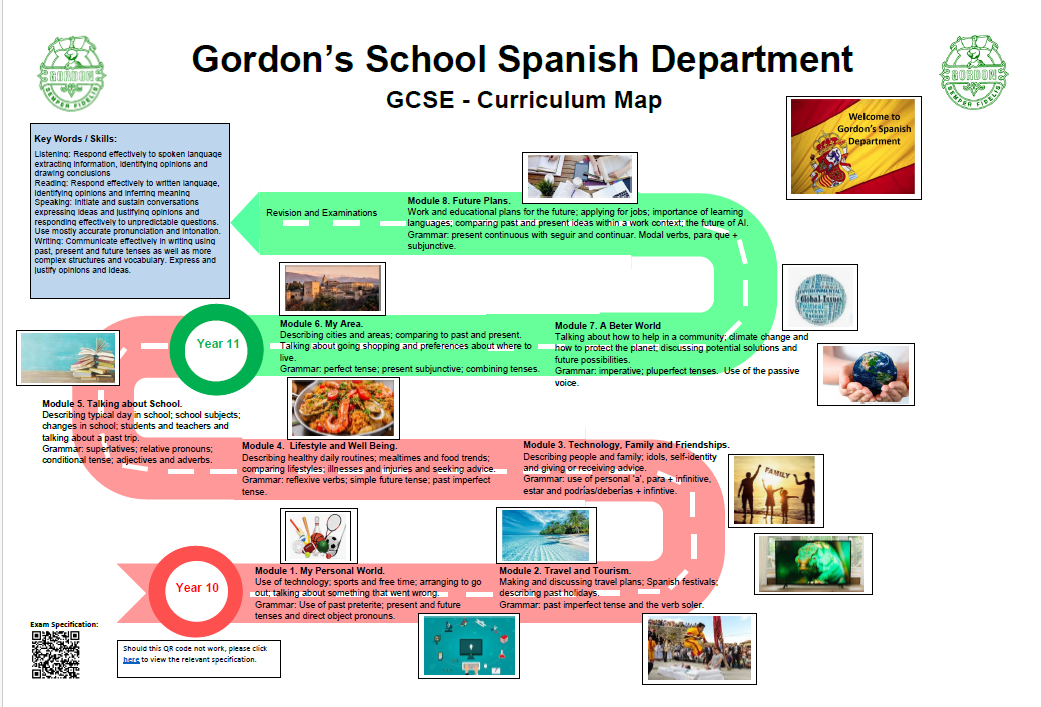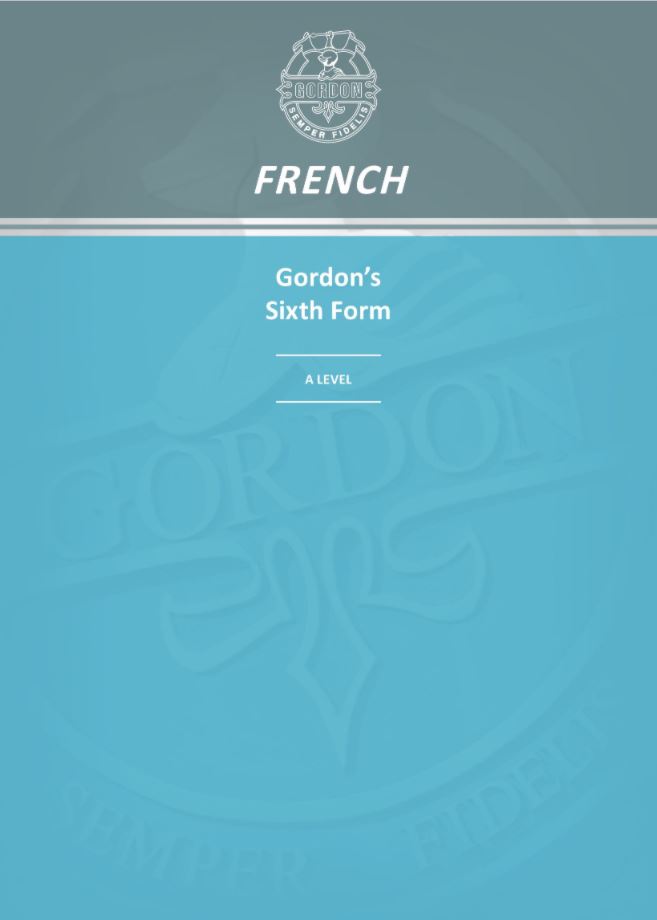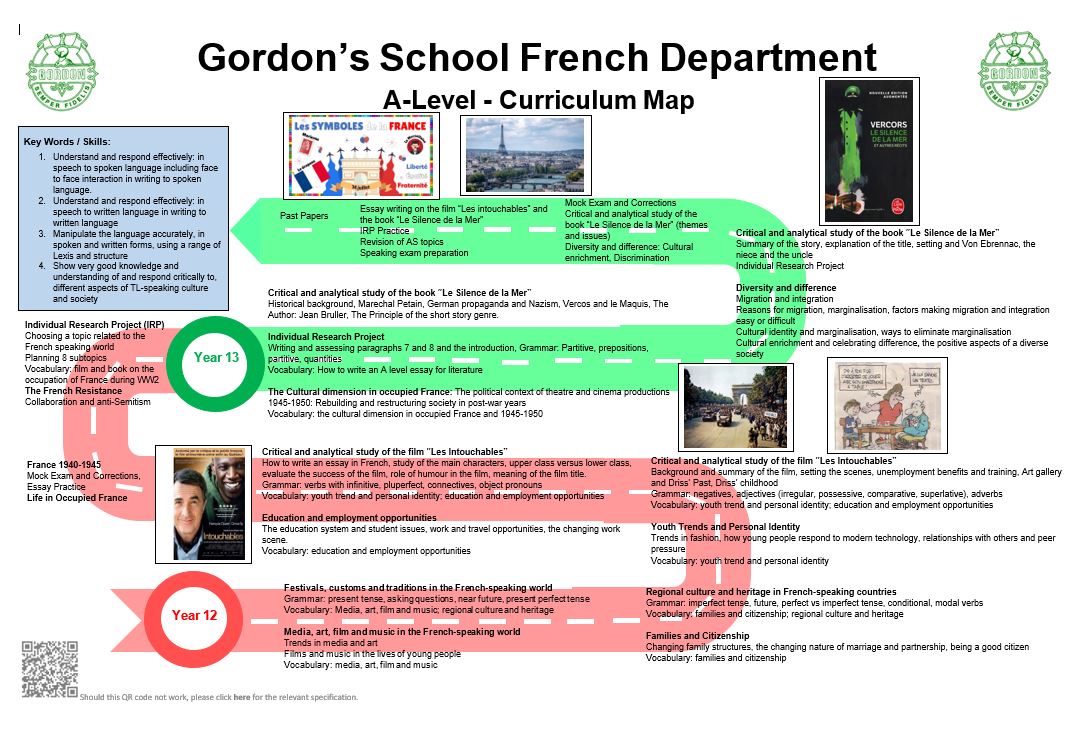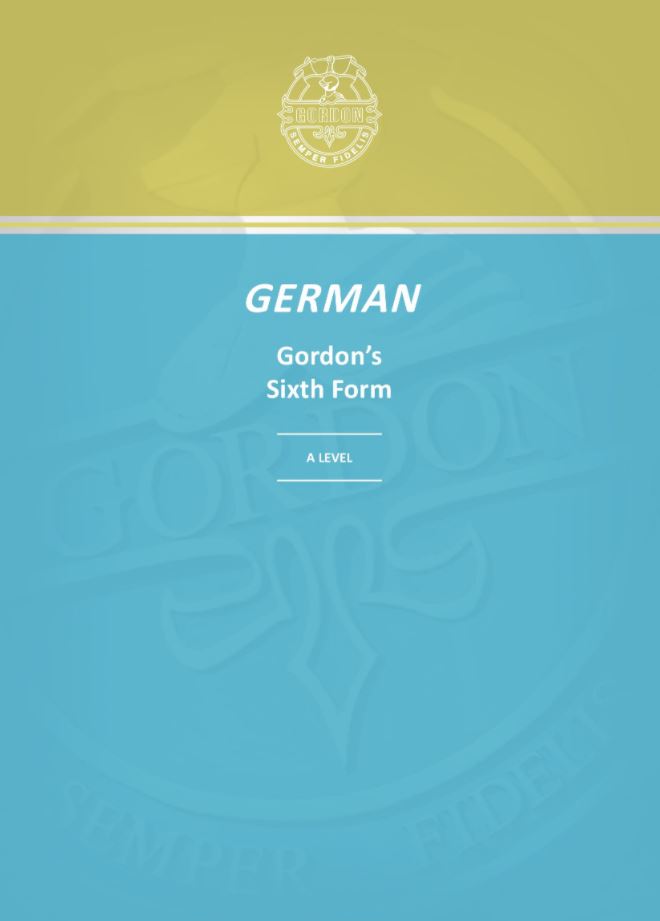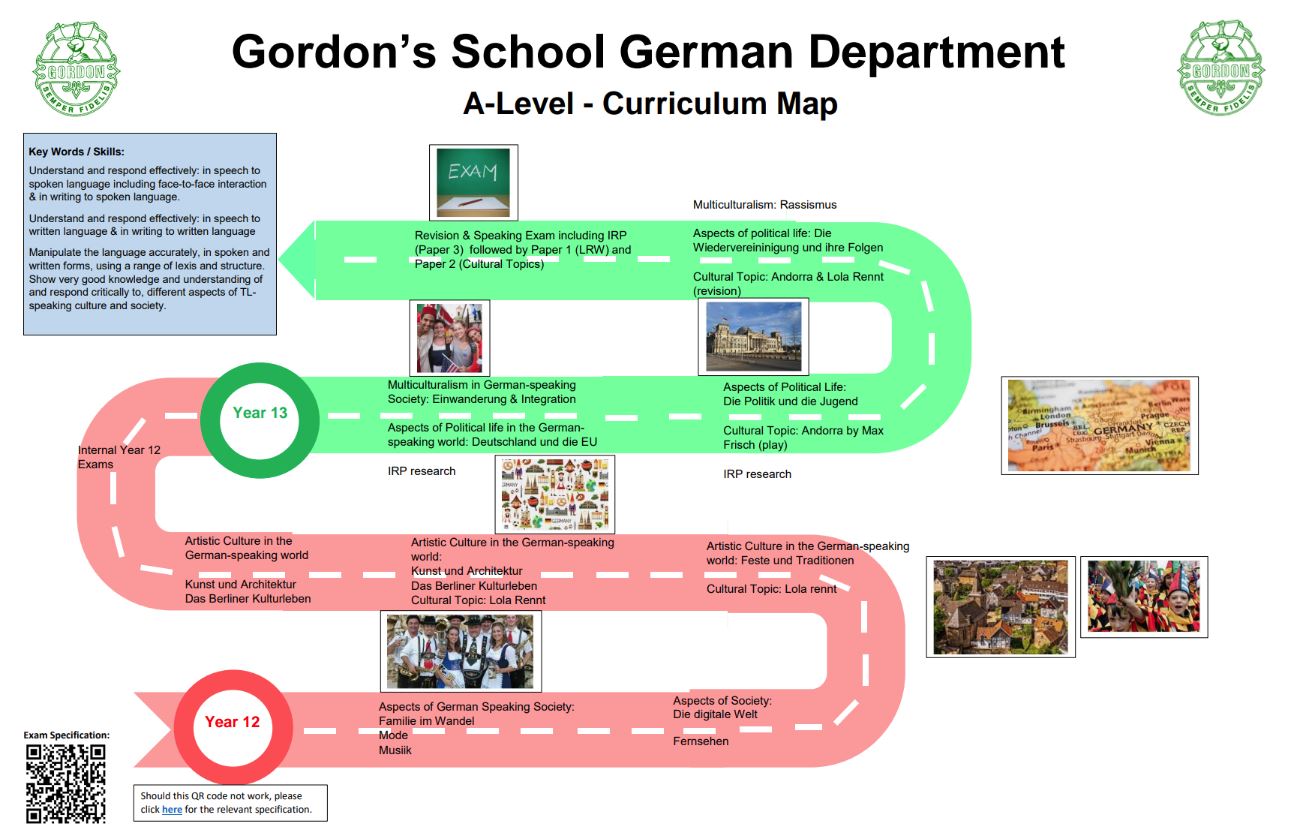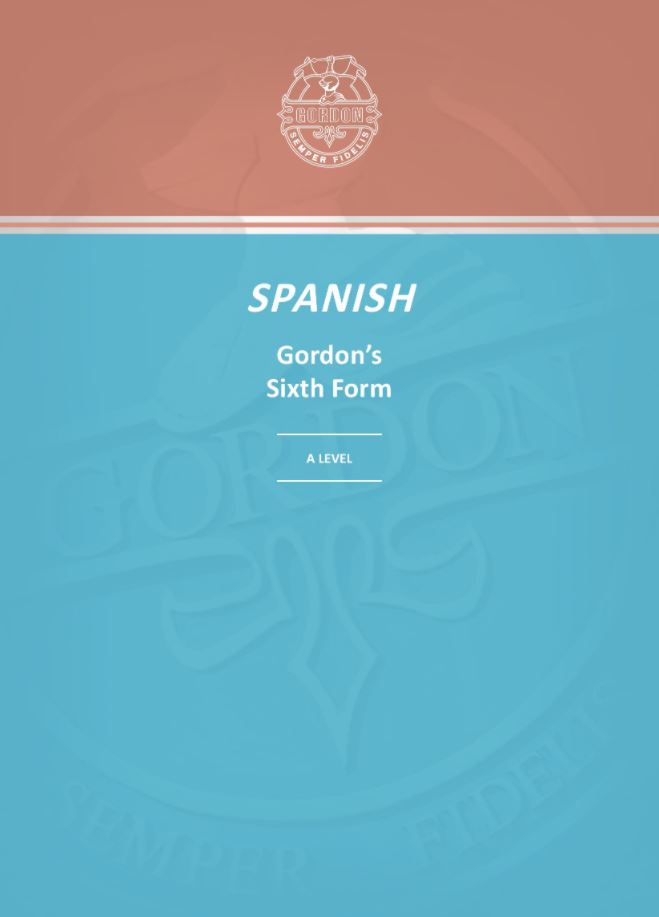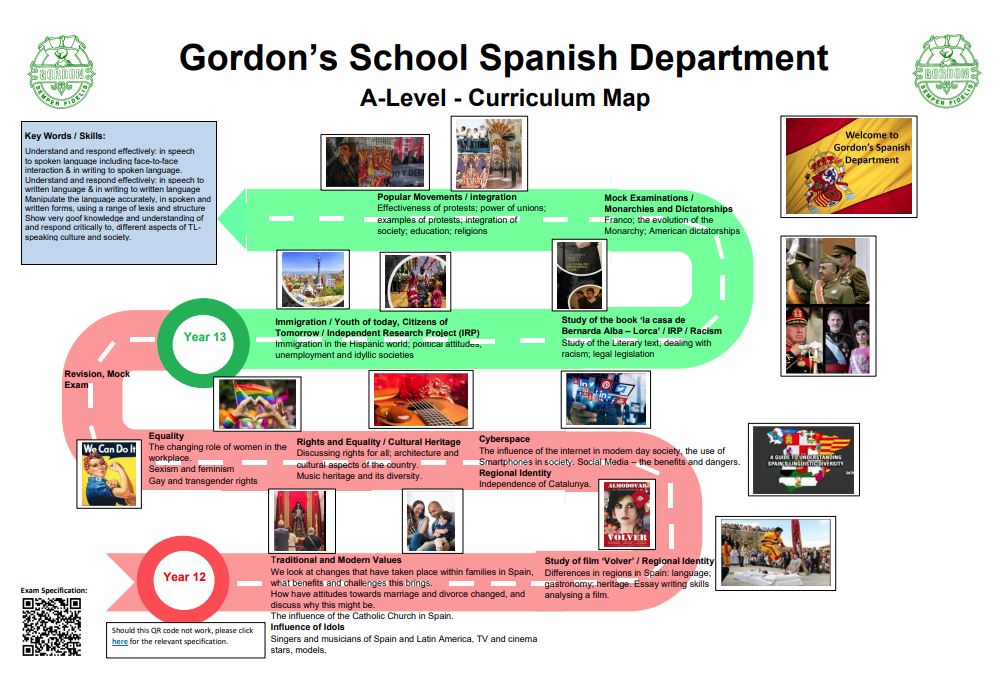Languages
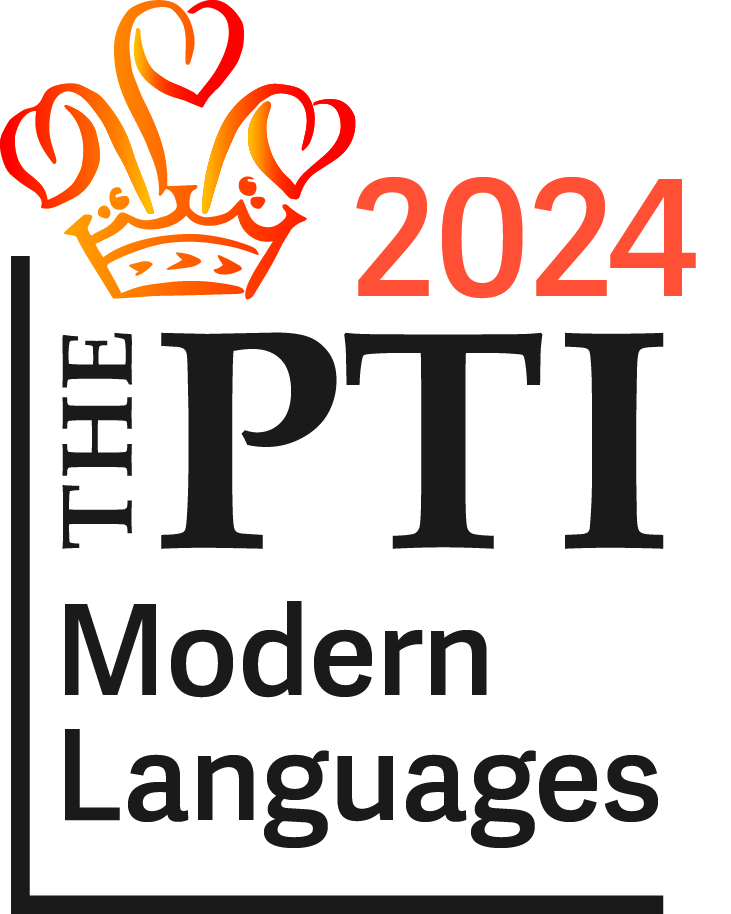
Summary
We teach French, German and Spanish at Gordon’s. Year 7 students are allocated a language during the application process which they will study from September of the year they start until the end of KS4.
French
Students who are allocated to study French learn a spectrum of topics in Key Stage 3 including self and family, home and environment, free time and technology. They also learn a range of tenses and grammar points and the skills necessary for language learning; reading, listening, speaking, writing and translation.
Students have the opportunity to take part in the Year 9 trip to Parc Astérix, Paris Olympic Stadium and the WW1 town of Arras and the Year 11/Year13 trip to Paris.
German
At Key Stage 3, we use the Stimmt! Course to provide a framework for our learning whilst employing many Extensive Processing Instruction techniques to help improve students’ listening and speaking skills. Students will learn to talk about themselves and their families and local area and be able to use 3 tenses and talk about a wide variety of topics by the end of KS3. There is a biennial KS3 trip to Cologne that students can attend whilst either in Year 8 or Year 9.
Spanish
Using the Viva course books, students focus on the foundations of the language throughout such as basic grammar points and the skills necessary for language learning; reading, listening, speaking, writing and translation. Topic specific vocabulary enabling students to talk about a variety of topics and contexts such as on topics such as self and family, home and environment and free time and technology, using the past, present and future tenses.
Head of MFL: Mr Depoix sdepoix@gordons.school
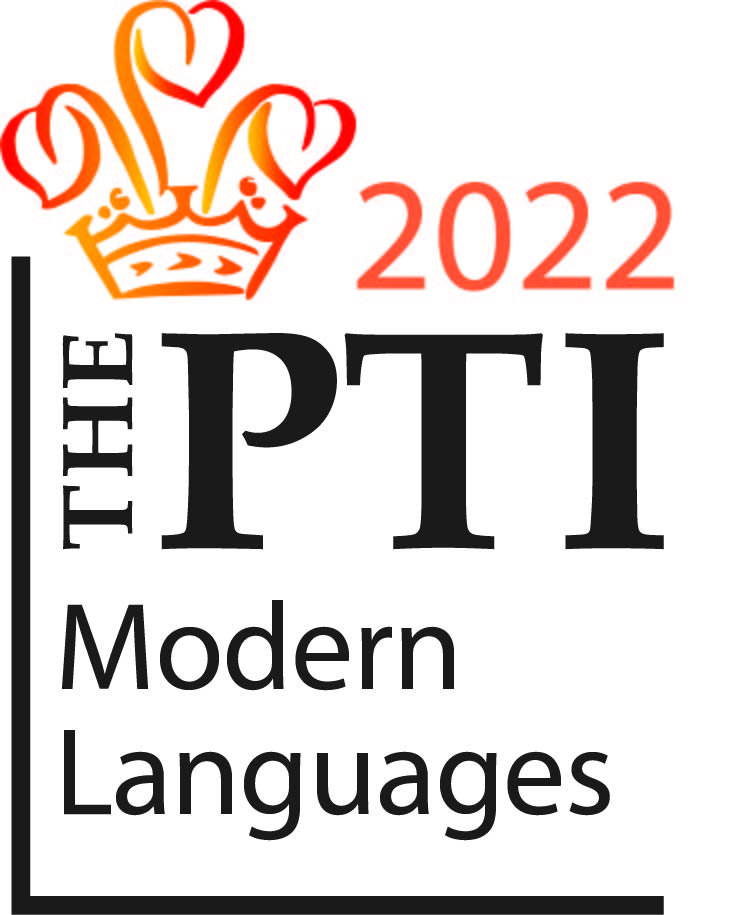
Summary
French
GCSE French provides a solid foundation for progression to other language studies, including A Level French. Students gain a strong grounding in a range of tenses and higher level structures as well as a broad spread of vocabulary.
Students have the opportunity to take part in the Year 11 trip to Paris where they not only visit the city but also take part in a variety of language activities.
German
We encourage all of our students to take part in the German Exchange with our partner school in Baden-Wurttemberg, which involves hosting a German partner at the end of Year 10 and then staying with them for a week at the end of the Autumn Term in December.
Spanish
GCSE Spanish provides a solid foundation for progression to other language studies, including A Level Spanish. Students gain a strong grounding in a range of tenses and higher level structures as well as a broad spread of vocabulary. Students are also are offered a five-day residential home-stay trip to Málaga with a cultural and educational focus, including meeting Spanish students and having lessons in a private school, visiting important cultural attractions and of course, lots of practice in listening and speaking Spanish. Clinics are provided to support, stretch and challenge students at GCSE level throughout the course and are run weekly during lunch times.
Course details
French
Students will study three topics which are an extension of Key Stage 3 topics:
- Identity and culture.
- Local, national, international and global areas of interest.
- Current and future study and employment
TYPICAL ACTIVITIES
- Reading and listening activities to improve vocabulary and comprehension.
- Speaking with teacher and peers.
- Producing different types of written pieces in the target language.
- Translation activities from and to French.
German
Students will study three themes which are an extension of Key Stage 3 topics:
Theme 1: Identity and Culture (me, family, friends, technology, free time, customs and festivals).
Theme 2: Local, National, International and Global Areas of Interest (home and local area, global issues including environment, travel and tourism).
Theme 3: Current and Future Study and Employment (school, work experience, further education jobs)
TYPICAL ACTIVITIES
- Reading and listening activities to improve vocabulary and test comprehension.
- Speaking with teacher, foreign language assistant and peers.
- Producing different types of writing pieces in the target language.
Spanish
Students study all of the following themes on which the assessments are based.
Theme 1: Identity and culture.
Theme 2: Local, national, international and global areas of interest.
Theme 3: Current and future study and employment.
TYPICAL ACTIVITIES
- Reading and listening activities to improve vocabulary and comprehension.
- Speaking with teacher and peers.
- Producing different types of writing pieces in the target language.
Mandarin
Students will study three themes which are an extension of Key Stage 3 topics:
Theme 1: Identity and Culture (me, family, friends, technology, free time, customs and festivals).
Theme 2: Local, National, International and Global Areas of Interest (home and local area, global issues including environment, travel and tourism).
Theme 3: Current and Future Study and Employment (school, work experience, further education jobs)
TYPICAL ACTIVITIES
- Reading and listening activities to improve vocabulary and test comprehension.
- Speaking with native speaker, teacher and peers.
- Producing different types of writing pieces in the target language.

Summary
French
At A-Level, students study Families and Citizenship, Youth Trends and Personal Identity, Education and Employment Opportunities, Regional Culture and Heritage in France, French-speaking Countries and Communities and Media, Art, Film and Music in the French-speaking World. As well as these topics, students also complete an in-depth study of the film The Intouchables.
German
Students learn about aspects of German-speaking society and artistic culture in the German-speaking world. We offer the opportunity to take part in the German exchange (see below for further details) as well facilitating work experience in Germany if so desired. We are seeing increasing numbers of external students joining as for A-Level German as our reputation as a local centre of excellence grows.
Spanish
AA-Level Spanish (AQA Syllabus) is designed to allow students to use their linguistic abilities to discuss, debate and express their own opinions on a wide variety of topics such as the changing role of family in society, youth movements, the Spanish civil war and dictatorships. Students will also study in depth the film Volver and the play, la casa de Bernarda Alba. Spanish at Key Stage 5 is a challenging yet greatly rewarding subject, especially for those students who wish to further study languages after school or in supporting university and job applications where language students are valued highly. Students are also are offered a five-day residential home-stay trip to Málaga with a cultural and educational focus, including meeting Spanish students and having lessons in a private school, visiting important cultural attractions and of course, lots of practice in listening and speaking Spanish. Clinics are provided to support, stretch and challenge students at A level throughout the course and are run weekly during lunch times.
Course details
French
Unit 1: Social Issues and Trends: Students will study three topics within this unit; families and citizenship, youth trends and personal identity and education and employment opportunities
Unit 2: Understanding the French speaking world: For this unit students will study regional culture and heritage in France, media, art, film and music in the French speaking world
Prescribed works: Vercors: Le silence de la Mer (Year 13) and Éric Toledano, Olivier Nakache: Intouchables (Year 12)
Year 13 Only
Unit 3: Diversity and difference: In this unit students will study migration and integration, cultural identity and marginalization, cultural enrichment and difference and discrimination and diversity
Unit 4: France 1940-1950: Students will study June 1940-May 1945, The cultural dimension in occupied France and 1945-1950
German
Paper 1: Listening, reading and writing: Aspects of German-speaking society
Artistic culture in the German-speaking world
Grammar: Written exam: 1 hour 45 minutes (AS) 2 hours 30 minutes (A Level) In Year 13 this paper includes Multiculturalism and Aspects of Political Life as topics
Paper 2: Writing: One text or one film from the lists in the specification (Lola Rennt: Tom Tykwer)
Grammar: Written exam: 1 hour 30 minutes (AS) 2 hours (A Level)
In Year 13 you will study the set text (Andorra: Max Frisch) as well
Paper 3: Speaking: AS: One sub-theme from Aspects of German-speaking society and one sub-theme from
Artistic culture in the German-speaking world
A Level: Individual research project
One of four sub-themes i.e. Aspects of German-speaking society or Artistic culture in the German-speaking world or Multiculturalism in German-speaking society or Aspects of political life in German-speaking society
Speaking exam: 12-14 minutes (AS) 21-23 minutes (A Level)
Spanish
Unit 1: Social issues and trends including aspects of Hispanic society such as values, Cyberspace, Equal rights and a focus on multiculturalism in Hispanic society which also comprises Immigration, Racism, Integration. The third aspect of this unit is Grammar.
Unit 2: Political and artistic culture which includes artistic culture in the Hispanic world, modern day idols, regional identity and cultural heritage. The second part of this unit is Aspects of political life in the Hispanic World with the subtopics of Today’s youth tomorrows’ citizens, Monarchies and dictatorships, Popular movements.
There is also a section which is examined and which has optional content where students will study one literary text and one film. The film – Volver Pedro Almódovar and Text - la casa de Bernarda Alba.
Entry Criteria
French: GCSE grade 6 in French
German: GCSE grade 6 in German
Spanish: GCSE grade 6 in Spanish

